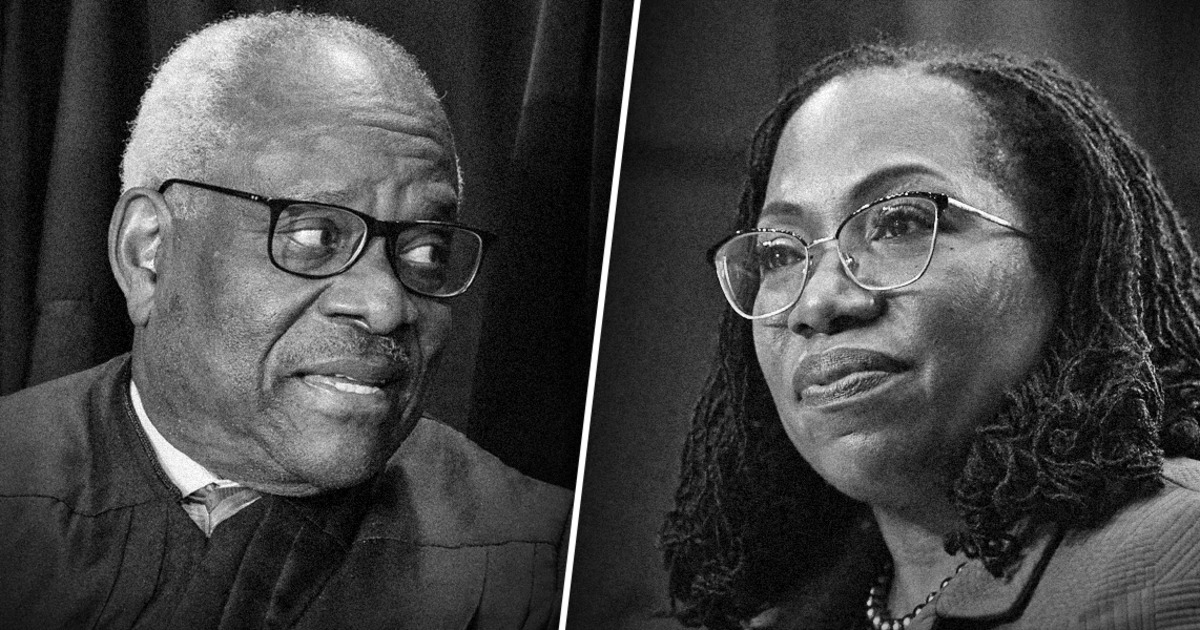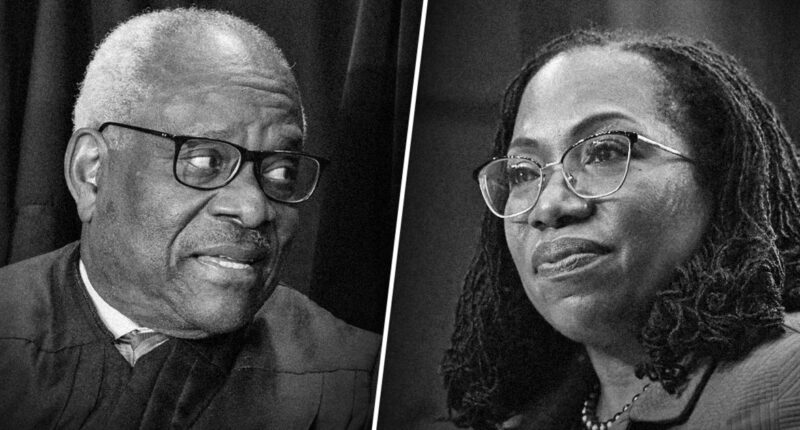
WASHINGTON — When the Supreme Court struck down college affirmative action programs, conservative Justice Clarence Thomas laid out his vision for a “colorblind Constitution” in which the law must apply equally to everyone, even when it is aimed at redressing historical racial discrimination.
In his dense and heartfelt 58-page concurring opinion that drew upon his own experiences as a Black man, Thomas mounted what he called a “defense of the colorblind Constitution” in order to clarify that “all forms of discrimination based on race — including so-called affirmative action — are prohibited under the Constitution.”
But his remarks met with fierce resistance both inside and outside the court, illustrating how the conservative argument that the law should take no account of race at all is a hotly contested issue.
Liberal Justice Ketanji Brown Jackson, who, along with Thomas, is one of only three Black justices who have ever served on the court, responded bitterly to her conservative colleague in her own dissenting opinion in the affirmative action case.
“With let-them-eat-cake obliviousness, today, the majority pulls the ripcord and announces ‘colorblindness for all’ by legal fiat. But deeming race irrelevant in law does not make it so in life,” Jackson wrote.
She argued that for many Americans, race permeates their “lived experience” daily.
“The best that can be said of the majority’s perspective is that it proceeds (ostrich-like) from the hope that preventing consideration of race will end racism,” Jackson wrote.
The approach embraced by the court in Chief Justice John Roberts’ majority opinion on Thursday has been a long-term goal of conservative legal activists.
Ilya Shapiro, a scholar at the conservative Manhattan Institute, welcomed the majority’s decision, saying that at least regarding education, the court has adopted a clear colorblind standard.
“I don’t think there’s any wiggle room,” he said.
Roman Martinez, a former Roberts law clerk, said the ruling was “the culmination of the chief’s longstanding efforts to limit what he views as unconstitutional uses of race in the educational context.”
For civil rights activists, the decision to embrace colorblind language was a stinging blow.
“The idea that the Constitution or the country itself is colorblind is farcical,” said Janai Nelson, president of the Legal Defense Fund.
“Race and the subjugation of Black and Indigenous people especially are part of the legal underpinnings of our society and persist today,” she said.
The silver lining for those on the left was that the affirmative action ruling was only one of three race-related cases before the justices in the term that ended Friday in which “colorblind Constitution” arguments succeeded.
When the Supreme Court’s term began in October, there was a buzz of expectation among court watchers that the three cases would give the conservative justices — who hold a 6-3 majority — an opportunity to make a big statement about their adherence to the idea.
But in the two other cases, one involving the landmark Voting Rights Act and another challenging a federal law governing Native American adoptions, the divided court rejected claims brought by conservative lawyers pushing what they said were race-neutral interpretations of the law.
Instead of weakening a key provision of the 1965 Voting Rights Act in a congressional redistricting case from Alabama, the court buttressed it.
Instead of striking down parts of the 1978 Indian Child Welfare Act, the court mostly upheld it while turning away other claims.
Both rulings came as unexpected relief to civil rights groups.
Jon Greenbaum, a lawyer at the Lawyers’ Committee for Civil Rights Under Law, said he was “pleased but not necessarily surprised” that the court stopped short of embracing race-neutral arguments across the board.
“I wasn’t sure there were five votes for that proposition,” he said.
It was turned away most forcefully in the Alabama case in which the Republican-led state had sought to overturn a lower court ruling that said its congressional district map discriminated against Black voters by diluting their votes among different districts where white voters dominate.
The state had argued that in such cases courts should not focus on racial factors when there is evidence that “race neutral” considerations were taken into account as part of the map-drawing process.
But in a major surprise, Roberts — who authored a 2013 ruling that gutted a separate provision of the Voting Rights Act — wrote the majority opinion issued on June 8 rejecting Alabama’s argument.
A week later, conservative Justice Amy Coney Barrett authored the 7-2 ruling in the Native American adoption case, finding that Congress had broad authority to legislate on family law issues.
In both cases, however, the court left open the possibility of future race-based challenges, meaning defenders of both federal laws could not rest easy.
The court did not consider the merits of the claim that the adoption law discriminated on the basis of race by giving preferences to Native American families seeking to adopt Native American children.
Emphasizing that the race discrimination issue is still undecided, conservative Justice Brett Kavanaugh wrote in a concurring opinion that it is a “serious” question that the court should decide in a subsequent case.
Kavanaugh made a similar pronouncement in the voting rights case, saying that he did not rule out challenges based on whether there is a time at which the 1965 law’s authorization of the consideration of race in redistricting is no longer justified.
Shapiro said the court’s decision not to address head on the race issues in the voting and Native American cases might reflect Roberts’ preferred slow and stead approach to changing the law, something his fellow conservatives on the bench do not always agree with.
“The court led by Roberts doesn’t want to decide things it doesn’t need to decide,” he said.
Source: | This article originally belongs to Nbcnews.com









